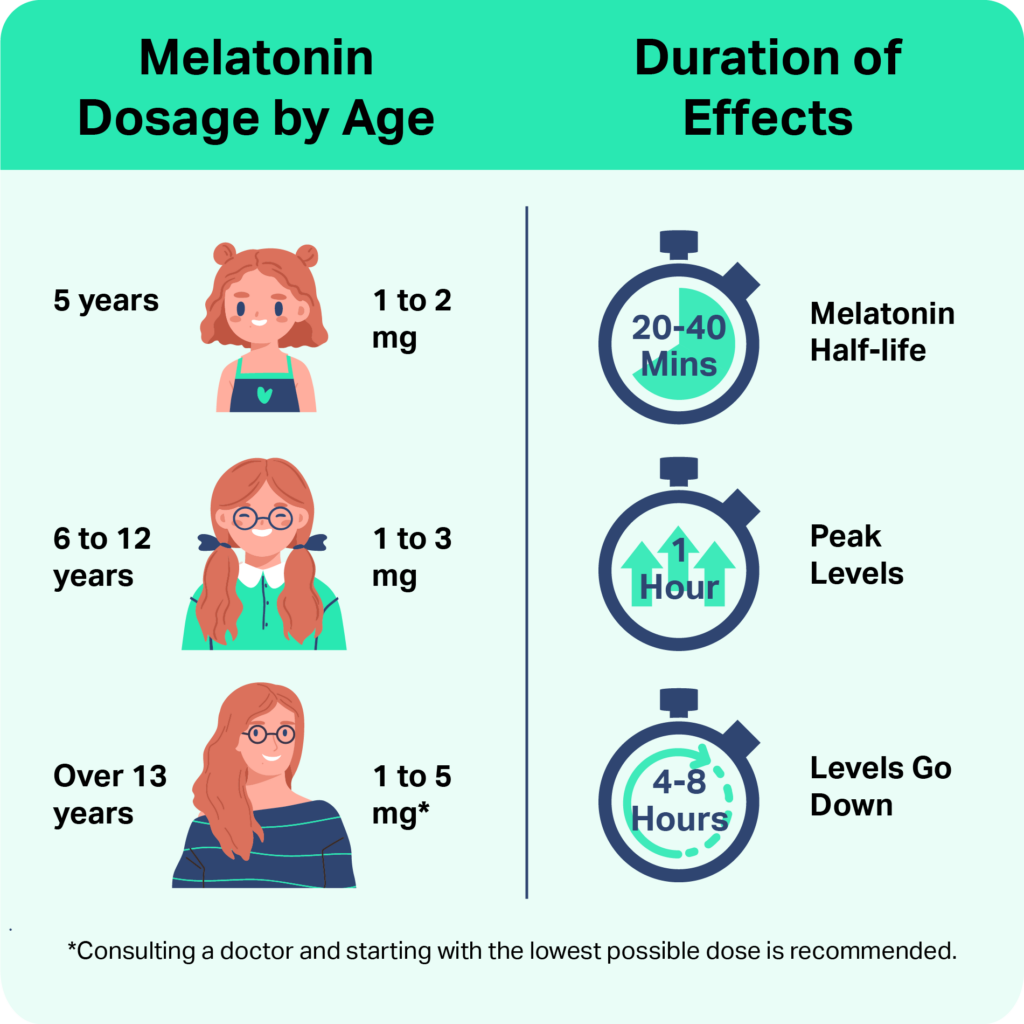Can You Overdose on Melatonin?
Melatonin is a hormone that plays a significant role in the regulation of sleep and circadian rhythms. Dubbed the sleep hormone, melatonin is formed in the brain’s pineal gland in response to falling light levels to prepare the body for sleep.
In recent years, melatonin supplements marketed to treat a variety of sleep disorders have become common. From 2007 to 2012, melatonin use in the U.S. doubled and it now ranks as one of the nation’s most popular supplements. Its popularity stems in part from its image as a natural alternative to traditional sleep medications, which are known for side effects. However, this does not mean melatonin supplements are harmless.
It is important to be aware of the safety risks posed by taking too much melatonin. We take a closer look at melatonin dosing, potential symptoms of a melatonin overdose, and when to contact a doctor.
How Much Melatonin Is Safe to Take?
Melatonin is available to purchase in any quantity, without a prescription in the U.S. However, there is currently no formal consensus on the optimal dosing regimen for this supplement. Studies frequently use doses ranging from 0.1 to 10 milligrams , but 1 to 5 milligrams is often considered an appropriate amount to start.
There are many challenges to determining the appropriate amount of melatonin for any one person to take. Individual responses to this supplement can vary considerably due to factors that are not fully understood but can include age, gender, specific sleep issues, other health conditions, and timing of administration.

In addition, not all melatonin supplements are created equal. Differences in preparation can significantly alter melatonin’s impact. Depending on the formulation, taking 1 to 10 milligrams of melatonin can raise the body’s melatonin blood levels anywhere from 3 to 60 times the normal amount.
Melatonin users should also be wary of the dosages listed on supplement labels, which have shown to be alarmingly inaccurate. A random sampling of 31 brands of melatonin supplements determined that most did not contain the labeled dose, with the actual amount ranging anywhere from less than 80% to nearly 500% as much. Additionally, over one quarter of the supplements contained serotonin.
Despite the lack of data and variability around dosing regimens, with typical use, melatonin is largely considered safe and is generally well-tolerated in healthy adults. The risk of side effects is low, but can include mild headache, dizziness, nausea, and sleepiness.
The safety and efficacy of supplements is not closely monitored by the U.S. Food and Drug Administration (FDA). Shoppers should take additional measures to make sure they are purchasing reputable products.
Can You Overdose on Melatonin?
So far, there is no clinical evidence that short-term melatonin use can cause long-term problems in healthy adults. However, it is important to discuss melatonin supplementation with your doctor, as they can help you determine the proper dosage. Starting with the lowest possible dose is typically recommended. This can help prevent unwanted side effects.
It is also important to note that high-quality studies addressing higher doses of melatonin are lacking. The current body of evidence consists mostly of small studies and case reports.
In one study, 12 adult males were administered intravenous melatonin in doses of 10 milligrams, 100 milligrams, or a placebo. There were no reported differences in sedation among the groups, and there were no harmful reactions. A second study gave five patients 1,000 milligrams of oral melatonin for approximately four weeks. While changes in pituitary hormones were observed, no toxic effects were reported.
What Are the Symptoms of a Melatonin Overdose?
Unwanted or troubling side effects can occur with any supplement, even if it is considered relatively safe. Concerning symptoms have been reported with higher doses of melatonin.
Possible symptoms of too much melatonin include:
- Headache
- Hypotension (low blood pressure)
- Hypertension (high blood pressure)
- Drowsiness
- Vomiting
- Worsening of alopecia areata (an autoimmune disorder causing hair loss)
Because melatonin can affect the cardiovascular, dermatologic, and central nervous systems, those with other conditions may be vulnerable to additional risks. Evidence suggests that melatonin supplementation may induce depression , particularly in people predisposed to or currently experiencing it. Research on this topic, however, is conflicting, since some studies have demonstrated the potential for melatonin to treat depression .
People taking blood thinners and benzodiazepines should be careful, as there is a possibility for interaction . Those with epilepsy should also exercise caution, as melatonin has been associated with increased seizures. People who are currently taking other medications or supplements should discuss potential interactions directly with their doctor before taking melatonin.
Research suggests that elderly people, who have lower natural levels of melatonin , may be more sensitive to the effects of melatonin supplements. Therefore, older people are encouraged to check with their doctor before taking melatonin and start with the lowest possible dose.
What Do I Do If I’m Experiencing Symptoms of a Melatonin Overdose?
Compared with most other sleep aids, melatonin clears the body quickly, and its effects are short-lasting. If you are experiencing unwanted symptoms after taking melatonin, you can most likely just wait it out as your body processes the drug. However, when in doubt, it’s always a good idea to seek professional advice. Don’t hesitate to contact your doctor or local poison control for guidance on managing worrisome symptoms or determining whether you need medical care.

What Are the Long-Term Effects of Taking Melatonin?
Minimal research exists on using melatonin beyond a few months. Therefore, there is much we do not know about its long-term effects. There is not even agreement on what constitutes long-term melatonin use.
Most of the concern around taking melatonin for extended periods centers around it’s potential to affect reproductive hormones. While the exact mechanism of action is still unclear, some reports indicate that melatonin may inhibit reproductive hormones .
Is Melatonin Safe for Children?
Further research is needed regarding the safety of melatonin for children.
Nearly 25% of children have difficulty sleeping , and parents increasingly turn to melatonin for help. Between 2007 and 2012, pediatric melatonin use rose seven-fold and is now the second most common natural supplement in this age group.
Despite its prevalence, there are reasons for parents to be cautious about using melatonin. It appears that children may be particularly vulnerable to the possible effects of this supplement on reproductive hormones. Melatonin has been associated with puberty delays , irregular menstruation, and overproduction of the hormone prolactin. It is important to note, however, that research on this topic is conflicting , and experts agree that the topic is understudied.
Parents should also be aware that melatonin may decrease blood pressure or serum glucose levels . Children taking other medications or who have illnesses affecting these systems should consult their doctor before starting melatonin.
Melatonin should only be used for children under the guidance of a doctor. Most pediatric sleep disorders can be managed with behavioral changes, such as proper sleep hygiene and cognitive therapy. Melatonin should not be used before trying other measures.
When Should I Talk With a Doctor?
While melatonin is largely viewed as safe, it is not without risk. Perhaps the most significant risk is what we do not know about this supplement. While you are unlikely to cause any serious damage using melatonin, it’s best to proceed with caution. Seeing a doctor for an accurate diagnosis of a sleep condition can help you determine whether melatonin is suitable for your situation.
-
Study Finds Melatonin Gummies May Be Inaccurately Labeled
April 25, 2023 – A small study of melatonin gummies discovered inaccurate labeling, with melatonin and cannabidiol (CBD) exceeding the declared amount. -
Long-Term Use of Low to Moderate Dosages of Melatonin Appears to Be Safe
March 15, 2023 – A literature review found that melatonin taken at low to moderate dosages for long periods appears safe and beneficial for certain populations. - Sleep Problems in People With Breast Cancer May Be Eased by Melatonin
-
Melatonin May Help Treat Sleep Disorders Linked to Parkinson’s Disease
Listed news articles do not represent the opinion of Sleep Foundation and are provided for informational purposes only.
Thanks for the feedback - we're glad you found our work instructive!
Submitting your Answer...
References
20 Sources
-
Clarke, T. C., Black, L. I., Stussman, B. J., Barnes, P. M., & Nahin, R. L. (2015). Trends in the use of complementary health approaches among adults: United States, 2002-2012. National health statistics reports, (79), 1–16.
https://pubmed.ncbi.nlm.nih.gov/25671660/ -
Buscemi N, Vandermeer B, Pandya R, Hooton N, Tjosvold L, Hartling L, Baker G, Vohra S, Klassen T. Melatonin for Treatment of Sleep Disorders. Evidence Report/Technology Assessment No. 108. (Prepared by the University of Alberta Evidence-based Practice Center, under Contract No. 290-02-0023.) AHRQ Publication No. 05-E002-2. Rockville, MD: Agency for Healthcare Research and Quality. November 2004.
https://www.ncbi.nlm.nih.gov/books/NBK37431/ -
Neubauer, D. N. (2022, May 18). Pharmacotherapy for insomnia in adults. In R. Benca & J. G. Elmore (Eds.). UpToDate., Retrieved July 15, 2022, from
https://www.uptodate.com/contents/pharmacotherapy-for-insomnia-in-adults -
Costello, R. B., Lentino, C. V., Boyd, C. C., O’Connell, M. L., Crawford, C. C., Sprengel, M. L., & Deuster, P. A. (2014). The effectiveness of melatonin for promoting healthy sleep: a rapid evidence assessment of the literature. Nutrition journal, 13, 106.
https://pubmed.ncbi.nlm.nih.gov/25380732/ -
Erland, L. A., & Saxena, P. K. (2017). Melatonin natural health products and supplements: Presence of serotonin and significant variability of melatonin content. Journal of Clinical Sleep Medicine, 13(2), 275–281.
https://pubmed.ncbi.nlm.nih.gov/27855744/ -
Auger, R. R., Burgess, H. J., Emens, J. S., Deriy, L. V., Thomas, S. M., & Sharkey, K. M. (2015). Clinical Practice Guideline for the Treatment of Intrinsic Circadian Rhythm Sleep-Wake Disorders: Advanced Sleep-Wake Phase Disorder (ASWPD), Delayed Sleep-Wake Phase Disorder (DSWPD), Non-24-Hour Sleep-Wake Rhythm Disorder (N24SWD), and Irregular Sleep-Wake Rhythm Disorder (ISWRD). An Update for 2015: An American Academy of Sleep Medicine Clinical Practice Guideline. Journal of clinical sleep medicine : JCSM : official publication of the American Academy of Sleep Medicine, 11(10), 1199–1236.
https://pubmed.ncbi.nlm.nih.gov/26414986/ -
National Center for Complementary and Integrative Health. (2021, January). Melatonin: What you need to know.
https://www.nccih.nih.gov/health/melatonin-what-you-need-to-know -
Andersen, L. P., Werner, M. U., Rosenkilde, M. M., Fenger, A. Q., Petersen, M. C., Rosenberg, J., & Gögenur, I. (2016). Pharmacokinetics of high-dose intravenous melatonin in humans. Journal of clinical pharmacology, 56(3), 324–329.
https://pubmed.ncbi.nlm.nih.gov/26184078/ -
Nordlund, J. J., & Lerner, A. B. (1977). The effects of oral melatonin on skin color and on the release of pituitary hormones. The Journal of clinical endocrinology and metabolism, 45(4), 768–774.
https://pubmed.ncbi.nlm.nih.gov/914981/ -
Shane-McWhorter, L. (2020, July). Melatonin. Merck Manual Professional Version., Retrieved April 7, 2021, from
https://www.merckmanuals.com/professional/special-subjects/dietary-supplements/melatonin -
Hansen, M. V., Andersen, L. T., Madsen, M. T., Hageman, I., Rasmussen, L. S., Bokmand, S., Rosenberg, J., & Gögenur, I. (2014). Effect of melatonin on depressive symptoms and anxiety in patients undergoing breast cancer surgery: a randomized, double-blind, placebo-controlled trial. Breast cancer research and treatment, 145(3), 683–695
https://pubmed.ncbi.nlm.nih.gov/24756186/ -
Holliman, B. J., & Chyka, P. A. (1997). Problems in assessment of acute melatonin overdose. Southern medical journal, 90(4), 451–453.
https://pubmed.ncbi.nlm.nih.gov/9114843/ -
Vural, E. M., van Munster, B. C., & de Rooij, S. E. (2014). Optimal dosages for melatonin supplementation therapy in older adults: a systematic review of current literature. Drugs & aging, 31(6), 441–451.
https://pubmed.ncbi.nlm.nih.gov/24802882/ -
Luboshitzky, R., Shen-Orr, Z., Nave, R., Lavi, S., & Lavie, P. (2002). Melatonin administration alters semen quality in healthy men. Journal of andrology, 23(4), 572–578.
https://pubmed.ncbi.nlm.nih.gov/12065466/ -
Kennaway D. J. (2015). Potential safety issues in the use of the hormone melatonin in paediatrics. Journal of paediatrics and child health, 51(6), 584–589.
https://pubmed.ncbi.nlm.nih.gov/25643981/ -
Janjua, I., & Goldman, R. D. (2016). Sleep-related melatonin use in healthy children. Canadian Family Physician/Medecin de Famille Canadien, 62(4), 315–317.
https://pubmed.ncbi.nlm.nih.gov/27076541/ -
Black, L. I., Clarke, T. C., Barnes, P. M., Stussman, B. J., & Nahin, R. L. (2015). Use of complementary health approaches among children aged 4-17 years in the United States: National Health Interview Survey, 2007-2012. National health statistics reports, (78), 1–19.
https://pubmed.ncbi.nlm.nih.gov/25671583/ -
Boafo, A., Greenham, S., Alenezi, S., Robillard, R., Pajer, K., Tavakoli, P., & De Koninck, J. (2019). Could long-term administration of melatonin to prepubertal children affect timing of puberty? A clinician’s perspective. Nature and science of sleep, 11, 1–10.
https://pubmed.ncbi.nlm.nih.gov/30774488/ -
van Geijlswijk, I. M., Mol, R. H., Egberts, T. C., & Smits, M. G. (2011). Evaluation of sleep, puberty and mental health in children with long-term melatonin treatment for chronic idiopathic childhood sleep onset insomnia. Psychopharmacology, 216(1), 111–120.
https://pubmed.ncbi.nlm.nih.gov/21340475/ -
Esposito, S., Laino, D., D’Alonzo, R., Mencarelli, A., Di Genova, L., Fattorusso, A., Argentiero, A., & Mencaroni, E. (2019). Pediatric sleep disturbances and treatment with melatonin. Journal of translational medicine, 17(1), 77.
https://pubmed.ncbi.nlm.nih.gov/30871585/






















